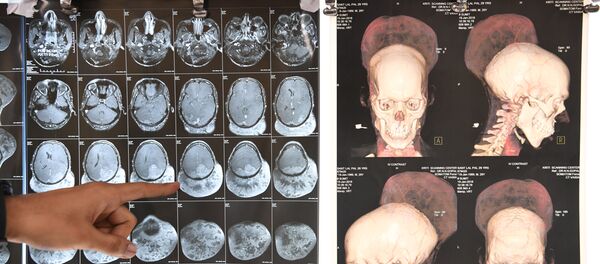When the unidentified man first arrived at the ER, doctors didn't realize what they were dealing with until they took an x-ray of the injury.
Imaging revealed that the potentially explosive part of a mortar-type firework had ended up in his right thigh. The patient told the doctors that the firework didn't explode when he first attempted to set it off. When he tried to reload the device a second time, he heard an explosion.
According to Lane Thaut, an emergency medicine resident at San Antonio Military Medical Center, although the medical staff kept their cool, they were apprehensive.
"When you hear that, yes, [the device] could be something that could potentially be explosive, of course everybody kind of gets a little bit on edge," Thaut told Live Science.
According to doctors, the patient had fractured his femur and the wound was "grossly contaminated."
The hospital contacted a team of Explosive Ordnance Disposal technicians and the local fire department. The patient was sequestered in a room away from other patients and was advised to remain still because excessive movement could cause the device to explode.
The fire department encouraged doctors to irrigate the wound with water to put out the fuse and avoid any procedures involving electricity, lest it spark an explosion. Electrocautery procedures, which heat tissues using electricity, are often used to remove unwanted or harmful tissue, burn and seal blood vessels or stop bleeding during surgery or after an injury.
The surgeons managed to successfully remove the firework sans explosion or complications. A metal rod was placed inside the patient's femur to treat the fracture. The man also underwent a skin graft procedure, a surgical operation in which a piece of healthy skin is transplanted to a new site on the body. The man was able to go home two weeks later.
Since removing unexploded devices wedged in patients is not common in medical civilian settings, the doctors decided to publish the case in The Journal of Emergency Medicine last month to impart to other medical professionals that such incidents could happen in civilian settings, especially as terrorist attacks in urban areas have "blurred the lines of the battlefield," the case report stated.
"This has the potential to be, unfortunately, an event that may be encountered by a provider in an emergency room setting," said Dr. Andrew Murtha, an orthopedic surgery resident who helped treat the patient.
"Understanding how to manage the patient without risking harm to other patients and the medical team is something that's important to recognize," Murtha told Live Science.
Some guidelines for taking on cases involving unexploded devices include evacuating all personnel not treating the patient, notifying the local bomb squad, moving the patient to a location away from the hospital and wearing protective gear like body armor, ballistic eyewear and helmets.
In this case, the doctors were told they didn't need to move the patient away from the hospital or wear protective equipment because firework blasts can be avoided by using water to drown the fuse and by avoiding contact with heat. However, the fuses of military-grade weapons could blow up as a result of movement, pressure, radio frequencies from devices like cell phones or even sunlight.
Thaut said hospitals should have an established plan to handle such situations, including having contact information for the local bomb squad and other services readily available
"The emergency department is really the door of the hospital," Thaut said. "I think that any real trauma center or emergency department should be aware that this is a potential thing that could present to the door," he added.







